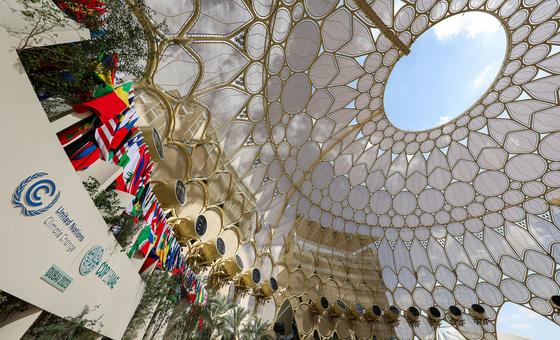The latest round of UN-facilitated climate talks opened on Thursday in Dubai, United Arab Emirates, with a warning that the world is taking “baby steps” in the face of a terrifying planetary crisis that requires bold action now.
“We are taking baby steps and stepping far too slowly to work out the best responses to the complex climate impacts we are faced with,” Executive Secretary of UN Climate Change Simon Stiell told delegates gathered for COP28.
The 28th annual meeting known as ‘COP’ after the Conference of Parties to the UN Framework Convention on Climate Change (UNFCCC), is scheduled to run through to 12 December.
The action takes place at the sprawling campus of Expo City decorated with trees and foliage. It is located on the outskirts of Dubai and is expected to host over 70,000 delegates, climate negotiators and other participants coming together to shape a better future for the planet.
And not a moment too soon: just hours ahead of the opening of the COP, the UN weather agency, known as WMO, issued a provisional report saying that this has “shattered” climate records accompanied by extreme weather which has left a trail of devastation and despair.
What’s at stake
In his remarks today, UN climate chief Stiell outlined just what’s at stake. “This has been the hottest year ever for humanity. So many terrifying records were broken,” he said, adding: We are paying with people’s lives and livelihoods.”
“Science tells us we have around six years before we exhaust the planet’s ability to cope with our emissions. Before we blow through the 1.5-degree limit,” he warned, referring to one of the keystone targets under the landmark Paris Agreement.
Ominously, a steady stream of reports published in the lead up to COP28 have shown that the world is way off-track in achieving climate goals. and in the absence of ambitious action, we are heading towards a temperature increase of 3 degrees by the end of this century.
Against this backdrop, Mr. Stiell called on countries to deliver ambitious new Nationally Determined Contributions (NDCs), or national climate action plans where every single commitment in 2025 – on finance, adaptation, and mitigation – must be in line with a 1.5-degree world.

Simon Stiell, UNFCCC Executive Secretary addresses the Formal Opening of COP28, at Expo City in Dubai, United Arab Emirates.
Progress on Paris Goals
The Dubai COP will mark the culmination of a process known as the ‘Global Stocktake’ – an evaluation of the progress so far on achieving key provisions of the Paris accord: namely curbing greenhouse gas emissions, building climate resilience and mobilizing financial support for vulnerable countries.
As such, the UNFCCC Executive Secretary said delegations at COP28 faced two options: The first would be to note the lack of progress, tweak current best practices “and encourage ourselves to do more ‘at some other point in time’.”
Or the conference could decide at what point it will have made everyone on the planet safe and resilient; to fund this transition properly including the response to loss and damage; and decide to commit to a new energy system.
Indeed, he warned: “If we do not signal the terminal decline of the fossil fuel era as we know it, we welcome our own terminal decline. And we choose to pay with people’s lives. If this transition isn’t just, we won’t transition at all. That means justice within and between countries.”
He also emphasized his focus on ensuring accountability for climate promises.
“Yes, this is the biggest COP yet – but attending a COP does not tick the climate box for the year. The badges around your necks make you responsible for delivering climate action here and at home.”
“I am committing the UNFCCC to track all announcements made and initiatives launched. So that long after the cameras have gone, we can ensure our promises continue to serve the planet,” Mr. Stiell added.
Thursday’s events marked the meeting’s procedural opening, but the conference will begin in earnest on Friday with a ‘climate action summit’ featuring the UN Secretary General alongside world leaders who will present national statements on what their governments are doing to address the global climate crisis.

